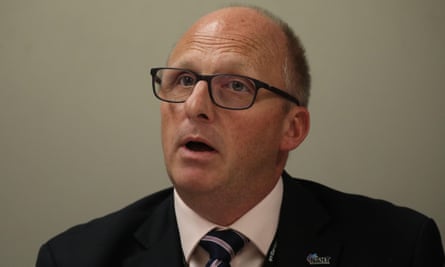Nine out of 10 schools will have run out of money by the next school year as the enormous burden of increased energy and salary bills takes its toll, the Observer can reveal.
Early data from the National Association of Head Teachers – results of a survey of its members are due later this month – shows that 50% of heads say their school will be in deficit this year, with almost all expecting to be in the red by next September,when their reserve run out. This comes as Jeremy Hunt has made clear that all departments, including education, will be expected to make cuts as part of the government’s debt reduction plan, to be announced on 31 October.
Headteachers and academy leaders are warning that further spending cuts will push many schools and academy trusts over the cliff, and result in most schools having to lose essential teaching and support staff. “There are no easy fixes left,” said Paul Whiteman, general secretary of the NAHT. “Schools are cut to the bone. This will mean cutting teaching hours, teaching assistants and teachers.”

The Rev Steve Chalke, whose Oasis foundation runs 52 academies in England, said: “At this burn rate, in under three years we will be bankrupt. No one is in a position to keep going for very long eating their reserves.” Chalke said electricity and gas costs for schools in his chain had rocketed from £26,000 a year to £89,000, even with the six-month energy price cap.
The foundation is also having to find an extra £4.5m for the teachers’ pay rise, which was announced this summer after school budgets had been set. The rise – which at 5% for most teachers remains significantly below inflation – is seen as crucial but has left schools floundering because it came with no new funding.
Chalke said he was “absolutely frustrated” that the government was planning further cuts. “Any government that neglects the welfare and education of its children had better be saving up for its future mental health and benefits bills, and investing in the justice system,” he added.
A spokesperson for the Department for Education said: “We understand that schools are facing cost pressures due to international events driving up energy prices.” She added that as well as the energy relief scheme, schools would receive £53.8bn in core funding this year “which includes a cash increase of £4bn”.
But Jonny Uttley, CEO of the Education Alliance academy trust, which runs seven schools in Hull and East Yorkshire, said: “I know a CEO of a large successful trust who says that after the unfunded teacher pay rises they won’t be a going concern next year unless there is extra funding.”
Uttley’s trust is using reserves to manage energy, pay and other costs but he said: “There comes a point where we simply run out of money.” Garry Ratcliffe, CEO of the Galaxy Trust, which runs three primary schools in Dartford, Kent, said his trust would be all right this year, but “next year will be very tough if there are any more unplanned announcements”. He warned that “a very significant funding crisis” was looming.
Ratcliffe’s trust is having to spend more on mental health support for children and staff struggling in the cost of living crisis. The school regularly provides food for desperate families, as well as helping parents claim extra benefits or challenge rent rises.
“Families who have never required support before are coming to us,” he said. “There is a great sense of shame for the dad who works every hour he can but still has to walk into school and ask for help.”
Leora Cruddas, chief executive of the Confederation of School Trusts, said this year was uncertain but next was looking really difficult: “Many trusts are having to use some or all of their reserves. But reserves can only be spent once. The government must intervene as a matter of urgency. State education must be funded adequately by the state.”
Julia Harnden, funding specialist at the Association of School and College Leaders union, said ministers must act now to avoid an impending educational disaster. “These extra costs will necessitate staffing cuts, which will mean larger class sizes, reduced curriculum options and less support for students,” she said.






